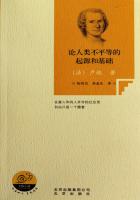Meanwhile, Isobel had other things to occupy her. Her mother, as she had said in the letter which Mr. Knight's sense of duty compelled him to steal, became very ill with lung trouble. The doctors announced that she ought to be taken to Egypt or some other warm climate, such as Algeria, for the winter months. Sir John would hear nothing of the sort. For years past he had chosen to consider that his wife was hypochondriacal, and all the medical opinions in London would not have induced him to change that view. The fact was, as may be guessed, that it did not suit him to leave England, and that for sundry reasons which need not be detailed, he did not wish that Isobel should accompany her mother to what he called "foreign parts." In his secret heart he reflected that if Lady Jane died, well, she died, and while heaven gained a saint, earth, or at any rate, Sir John Blake, would be no loser. She had played her part in his life, there was nothing more to be made of her either as a woman as a social asset. What would it matter if one more pale, uninteresting lady of title joined the majority?
Isobel had one of her stormy interviews with Sir John upon this matter of her mother's health.
"She ought to go abroad," she said.
"Who told you that?" asked her father.
"The doctors. I waited for them and asked them."
"Then you had no business to do so. You are an impertinent and interfering chit."
"Is it impertinent and interfering to be anxious about one's mother's health, even if one is a chit?" inquired Isobel, looking him straight in the eyes.
Then he broke out in his coarse way, saying things to his daughter of which he should have been ashamed.
She waited until he ceased, red-faced, and gasping, and replied:
"Were it not for my mother, whom you abuse, although she is such an angel and has always been so kind to you, I would leave you, Father, and earn my own living, or go with my uncle Edgar to Mexico, where he is to be appointed Minister, as he and Aunt Margaret asked me to. As it is I shall stop here, though if anything happens to Mother, because you will not send her abroad, I shall go if I have to run away. Why won't you let her go?" she added with a change of voice. "You need not come; I could look after her. If you think that Egypt or the other place is too far, you know the doctors say that perhaps Switzerland would do her good, and that is quite near."
He caught hold of this suggestion, and exclaimed, with a sneer:
"I know why you want to go to Switzerland, Miss. To run after that whipper-snapper of a parson's son, eh? Well, you shan't. And as for why I won't let her go, it's because I don't believe those doctors, who say one minute that she should go to Egypt, which is hot, and the next to Switzerland, which is cold. Moreover, I mean you to stop in England, and not go fooling about with a lot of strange men in these foreign places. You are grown up now and out, and I have my own plans for your future, which can't come off if you are away. We stop here till Christmas, and then go to London. There, that's all, so have done."
At these insults, especially that which had to do with Godfrey, Isobel turned perfectly scarlet and bit her lip till the blood ran. Then without another word she went away, leaving him, if the truth were known, a little frightened. Still, he would not alter his decision, partly because to do so must interfere with his plans, and he was a very obstinate man, and partly because he refused to be beaten by Isobel. This was, he felt, a trial of strength between them, and if he gave way now, she would be master. His wife's welfare did not enter into his calculations.
So they stopped in Essex, where matters went as the doctors had foretold, only more quickly than they expected. Lady Jane's complaint grew rapidly worse, so rapidly that soon there was no question of her going abroad. At the last moment Sir John grew frightened, as bullies are apt to do, and on receipt of an indignant letter from Lord Lynfield, now an old man, who had been informed of the facts by his grand-daughter, offered to send his wife to Egypt, or anywhere else.
Again the doctors were called in to report, and told him with brutal frankness that if their advice had been taken when it was first given, probably she would have lived for some years. As it was, it was impossible for her to travel, since the exertion might cause her death upon the journey, especially if she became seasick.
This verdict came to Isobel's knowledge as the first had done. Indeed, in his confusion, emphasized by several glasses of port, her father blurted it out himself.
"I wonder whether you will ever be sorry," was her sole comment.
Then she sat down to watch her mother die, and to think. Could there be any good God, she wondered, if He allowed such things to happen.
Poor girl! it was her first experience of the sort, and as yet she did not know what things are allowed to happen in this world in obedience to the workings of unalterable laws by whoever and for whatever purpose these may be decreed.















